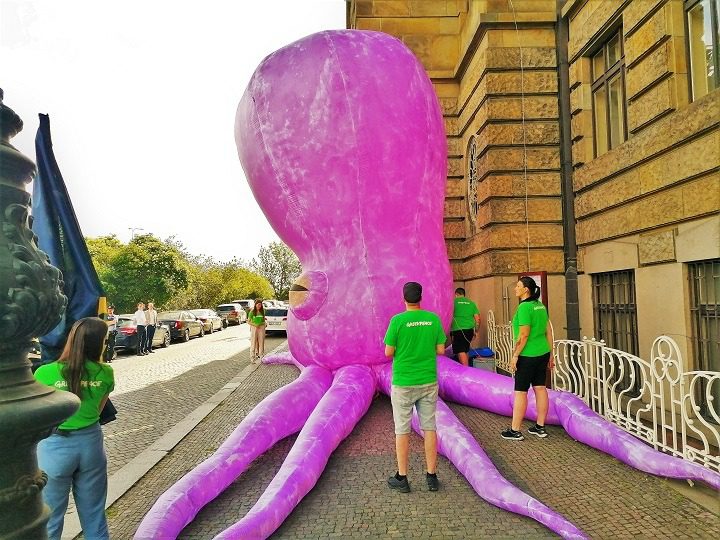On June 1, 2023, Greenpeace used a giant inflatable octopus to protest the potential mining of the seabed in front of the Ministry of Industry and Trade in Prague. The Ghost octopus, one of many unexplored animal species living in the depths of the sea, is used by Greenpeace as their mascot in the fight to preserve and care for the seabed.
The inflatable octopus, measuring about 14 meters from the tip of its head to the end of its tentacles, was accompanied by a banner inscription: “The seabed is my home. Do not destroy it”. The protest was meant to draw attention to the risks associated with deep-sea mining.
The Czech Republic sits on the Council of the International Seabed Authority (ISA), which decides whether to start preparing for the extraction of mineral resources from the world’s oceans. In July 2023, the request for setting regulations for this newly emerging industry will expire, and global companies could apply for mining permits for commercial purposes. Greenpeace believes that a strict moratorium should be established on the introduction of deep-sea mining.
The marine ecosystem is crucial for our survival, as the ocean stores most of the heat and about thirty percent of all carbon produced by humanity. We do not know how it will react to deep-sea mining. The carbon cycle may be disrupted. We must exercise foresight.
Greenpeace has found supporters in the industrial sector and among private companies. Global companies such as Volvo, BMW, Google, Samsung, Phillips, and Volkswagen Group, including Škoda Auto, have publicly committed not to use minerals that will be mined from the seabed.
The impact of mining would be enormous
Machines will make noise equivalent to the sound of millions of slaughterhouses. This noise will spread in waves throughout the sea, destroying all marine mammals and animals that orient themselves by sonar. We are talking about whales, dolphins, and orcas.
In practice, this means that giant machines will plow the seabed. It will be necessary to extract excavated rocks and massive stone blocks from a depth of up to five kilometers with huge suction devices. The rock will then either be directly into the sea or milled into smaller crushed rocks at processing plants, and precious and rare metals will be obtained from it by various chemical processes. The seabed is, for example, rich in deposits of nickel, molybdenum, manganese, or cobalt.
The world must exercise caution and foresight in deciding whether to start preparing for the extraction of mineral resources from the world’s oceans. The impact on the marine ecosystem and the planet must be considered before taking action.






